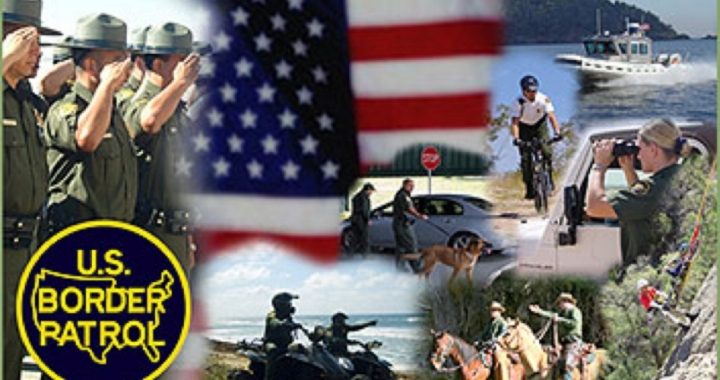
Citing national security, high American unemployment, budget deficits, and safety concerns, critics lambasted the Obama administration’s Department of Homeland Security for its recent decision to purchase over $7 million of U.S. Border Patrol uniforms that are made in Mexico. All across the political spectrum, members of the media, Congress, and law-enforcement advocates say the goods should be produced in America. However, despite previous uproars in recent years over similar contracts, the administration claims that it must accept the Mexican-made uniforms under the North American Free Trade Agreement.
Among the biggest concerns surrounding the controversial deal are the national security implications. Opponents point out that uniforms made in Mexico could be stolen, re-routed, or copied, allowing criminals to masquerade as Border Patrol agents while unlawfully crossing the border. Law Enforcement Officers Advocates Council (LEOAC) President Andy Ramirez, a longtime supporter of Border Patrol agents, cited national security and numerous other issues as his organization launched a campaign urging the public to call Congress in an effort to stop the contract.
“If uniforms are made, as well as insignia, and borrowed or stolen, then individuals can slip across the border, compromising the safety of our agents, other law enforcement officers, and civilians,” Ramirez told The New American. “Keep in mind that the patrol uses the badge patches on uniforms, so they can replicate the look of agents who can claim to be cutting sign [tracking], or off-duty and heading home. Pretty easy since there are so many agents and plenty of detailers. It would be impossible to know and recognize everyone. Hence, a national security issue and safety issue.”
Ramirez, who has testified before Congress on numerous occasions, added, “We know there are no quality controls when it comes to the [Mexican factories] maquiladoras, unlike our side of the border.” According to Ramirez’ sources in the Border Patrol, Mexican-made uniforms purchased in the past have been “substandard”: They tear easily, were not sized properly, and overall, were a “disaster,” Ramirez said, emphasizing that he told many members of Congress about the complaints in 2004 and 2005 when the issue first surfaced. “The $30 million was clearly an example of poorly spent taxpayer dollars,” Ramirez said about the previous round of purchases from Mexico. “The Defense Department policy does not allow for the official uniforms to be constructed outside CONUS [the continental United States], unlike DHS. Not even a policy on that one.”
It is also not the first time DHS has been under fire for buying uniforms and other goods that were made in Mexico. “I asked a question in 2004, and clearly it must be asked again today: What’s next? USBP agent badges made in Mexico with GPS trackers, too?” Ramirez wondered sarcastically.
Of course, more than a few people have been speaking out about the problems. In 2004, after the Border Patrol was put under the Homeland Security Department umbrella, new uniforms were also purchased from the same company, VF Solutions, now known as VF Imagewear. Then, as now, the firm manufactured the uniforms in Mexico, sparking outrage among agents.
“I’m embarrassed, not only as a Border Patrol agent but as an American citizen, that our government has decided to outsource the production of these uniforms with no regard for the safety of the process or the security of our country,” then-National Border Patrol Council (NBPC) Local 1613 President Joseph Dassaro told the Washington Times in 2004. “What system is in place to ensure that these uniforms are not stolen en masse or sold outright in Mexico to be used by terrorists, alien smugglers or drug dealers who could cross unimpeded into the United States?”
More recently, a similar scandal roiled even Democrat members of Congress. In 2011, after Homeland Security was exposed buying uniforms for Transportation Security Administration (TSA) personnel that were also manufactured in Mexico, Congresswoman Jackie Speier (D-Calif.) called a press conference. Speaking to reporters, she demanded that the uniforms be made in the United States for numerous reasons.
“This requirement would create hundreds of American jobs. More jobs mean more taxpayers. More taxpayers mean a more vibrant economy and a smaller deficit,” she said. “I’ve got to tell you, this really bothers me, and it should bother every American, that uniforms for U.S. workers — for federal employees — are being manufactured in a foreign country when we have so many people unemployed and so much of the middle class is hurting.”
There are also national security concerns, she said, echoing fears raised by agents and experts. “Uniforms have a greater potential of being stolen in Mexico where it is more difficult to provide oversight of factories and cargo,” read a statement released by Rep. Speier after her press conference blasting the administration and Homeland Security. “The uniforms of those who protect our nation should proudly say ‘Made in America’… Make it in America is a common sense policy. When it comes to U.S. government contracts, we have a right to demand that taxpayer dollars are used to create American jobs, not foreign ones.”
Homeland Security, however, citing “international agreements” that purportedly override U.S. authorities, still claims that its hands are tied. Responding to the latest uproar, Customs and Border Protection, part of DHS, issued a statement arguing that there were no agency rules or federal laws governing the purchase of uniforms made in foreign countries. Unsurprisingly, concerns about security and jobs were left unaddressed.
“There are no domestic preference regulations or statutes applicable to DHS/CPB that would prohibit the manufacture of uniform items in Mexico,” CBP said in a widely cited statement. “In fact, United States obligations under International Agreements require the Agency to accept items manufactured in Mexico. Consistent with the foregoing, VF is permitted to provide items manufactured in Mexico under the current contract.”
For Border Patrol agents and LEOAC chief Ramirez, however, that is just a lame excuse. “It is unconscionable and outrageous for DHS and CBP to award this $8 million contract for USBP agent uniforms and insignia to VF Imagewear as they did on Dec. 20th, 2012,” Ramirez said, calling for action in Congress. “This happened previously with VF back in 2004 to the tune of $30 million. Keep in mind: it is well known Al and Tipper Gore had a major financial interest in VF.”
According to Ramirez, America’s Border Patrol agents continue to have their safety compromised by senior officials — especially people, such as former CBP Commissioner David Aguilar. While Aguilar recently retired, Ramirez noted, both of the contracts for Mexican-made uniforms took place under the controversial ex-Border Patrol chief’s watch. Ironically, Aguilar once suggested that stolen Mexican military uniforms might have been used by drug smugglers during a documented incursion in Hudspeth County, Texas.
“It’s bad enough that agents have had their safety compromised by his policies, which leave agents using non-lethal weapons as they protect our nation from drug cartels, alien smuggling organizations, incursions from the Mexican military, and potential terrorists,” the LEOAC chief continued. “But to contract with a company that uses slave labor at Mexican sweat shops is something that must be stopped. The Defense Department policy forbids all Armed Service uniforms from being made abroad for security reasons, and this policy must be applied to DHS, too, immediately.”
Ramirez and his non-profit organization are calling on Congress to quickly enact a law prohibiting any U.S. law enforcement agency from contracting to buy uniforms, insignia, or apparel from outside of the United States. The goal, he said, is “to prevent copies, which could be used to compromise agent safety and national security.”
However, even if Congress were to get involved, a recent scandal shows that the administration will almost certainly do whatever it wants anyway. Despite a bipartisan prohibition on doing business with a Russian state-owned weapons dealer signed into law by Obama himself, the Department of Defense is still buying helicopters from Russia to supply the regime in Afghanistan. Critics of the lawlessness say it is time for Congress to get active and to rein in the administration immediately.
Alex Newman is a correspondent for The New American, covering economics, politics, and more. He can be reached at [email protected].
Related articles:
Defying Congress, Obama Sends U.S. Taxes to Russian State Arms Firm
Homeland Security Demands “Obedience” in Message to Agents
Obama to Strengthen NAFTA Without New Negotiations
Congress Seeks Answers on Huge Homeland Security Ammo Contracts



